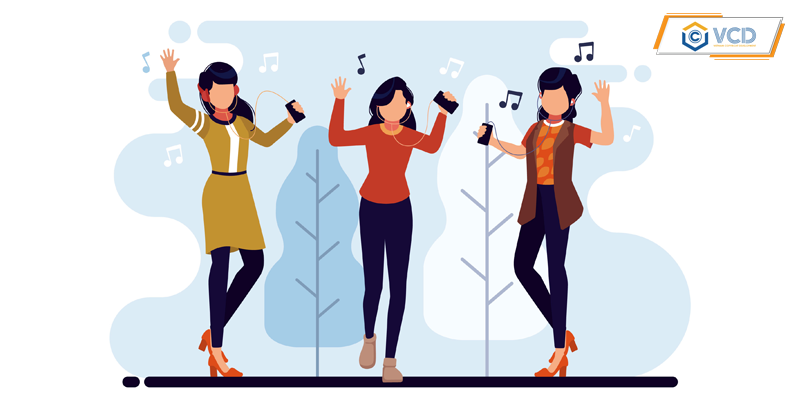Does the karaoke business have to pay royalties?
In Vietnam, when a new song is released, stores, cafes, restaurants, etc. can use the song to play back in their shops. Especially today’s karaoke bars all use songs for business, so when using those songs, do they have to pay royalties to the song author? Please follow VCD’s article below.
1. Regulations on Music Copyright
A musical work is expressed in the form of notes in sheet music or other musical characters or fixed on audio or video recordings with or without lyrics, regardless of whether they are performed or not. demonstration (Article 10 of Decree 22/2018/ND-CP).
As for audio and video recordings, they are the fixation of sounds and images of the performance or other sounds and images or the fixation of the reproduction of sounds and pictures other than in fixed form. images associated with a cinematographic work or a readable work created by a similar method.
According to the provisions of the Intellectual Property Law 2005 (amended and supplemented in 2009), audio and video recordings of songs are subject to the protection of related rights. Organizations and individuals that use published audio or video recordings in business and commercial activities do not have to ask for permission but must pay royalties and remuneration as agreed to by the author and owner. copyrights, performers, producers of audio and video recordings, and broadcasting organizations from the time of use (Clause 2, Article 33 of the Law on Intellectual Property).
Using audio or video recordings of songs is the direct or indirect use of those audio or video recordings by organizations or individuals for use at restaurants, hotels, stores, supermarkets; establishments providing karaoke services, postal services, telecommunications, and digital environment; in tourism, aviation, and public transportation activities.
Karaoke is a form of entertainment that sings song lyrics to pre-recorded music, the lyrics are displayed on a screen. In essence, the business object of karaoke services is the audio or video recording of a performance of musical works and these are all objects protected by intellectual property rights. However, in reality, in the karaoke business, business entities do not pay attention to paying royalties and remunerations to intellectual property rights owners.

2. Does the karaoke business have to pay royalties?
The current reality in the karaoke business, especially small-scale business owners, often does not pay attention to compliance with copyright regulations, and the use of songs without paying royalties still occurs. go out.
In addition to traditional karaoke activities, which means copying songs onto CDs or a permanent storage system, the Karaoke business today also relies on online audio and video recordings from websites such as YouTube. , nhaccuatui, and other online platforms have become popular.
However, the majority of Karaoke business people in Vietnam often only focus on meeting the conditions for operating a karaoke business according to the law, such as establishing a household business and complying with regulations on prevention and control. fire and explosion and minimum theater area.
Therefore, the use of recordings in the karaoke business in the case of using published audio and video recordings does not require permission but must pay royalties and remunerations as prescribed in Article 26 and Article 33. Intellectual property law.
Specifically, Clause 2, Article 43 of Decree 22/2018/ND-CP stipulates:
“Organizations and individuals that exploit and use works, audio and video recordings, and broadcast programs according to the provisions of Clause 1, Article 26, Clauses 1 and Clause 2, Article 3 of the Intellectual Property Law must Directly contact the copyright owner, related rights owner or collective representative organization of copyright or related rights regarding exploitation and use own copyright or related rights holders, organizations and individuals shall exploit and use works of audio and video recordings, broadcast programs, and announcements on the mass media”.
Along with that, Clause 1, Article 45 of Decree 22/2018/ND-CP also stipulates more specifically the case of exploiting and using audio and video recordings: “Organizations and individuals using directly or indirectly To receive audio or video recordings according to the provisions of Clauses 1 and 2, Article 33 of the Intellectual Property Law, royalties, remunerations, and material benefits must be paid to copyright owners and related rights owners. mandarin.”
Accordingly, although the author does not have to ask for permission when using the song at karaoke bars, they will have to pay royalties, remuneration, or other material benefits to the producer of the audio or video recording (or individual). individual or organization representing the author) according to the agreement of the parties or, if there is no agreement, according to the price schedule and payment method presided over by the Ministry of Culture, Sports and Tourism, in coordination with the Ministry of Finance. , issued by the Ministry of Information and Communications.
If an organization or individual uses a published audio or video recording for commercial purposes in a karaoke service business, postal and telecommunications service, or digital environment without paying for the use, Copyright owners and related rights owners according to regulations will be fined from 15,000,000 to 25,000,000 VND (according to Clause 3, Article 29 of Decree 131/2013/ND-CP).
However, in reality, VCD finds that collecting copyright and sound recording copyright fees is very difficult because there are many uses and it is difficult to control. The fee level is also not clear and reasonable, making collecting copyright fees even more difficult. Therefore, organizations and individuals doing karaoke business can look to organizations representing collective copyright and related rights recognized by law – organizations authorized by artists to copyright music, to Quickly fulfill obligations to pay royalties and remunerations for the use recorded in your business activities.
